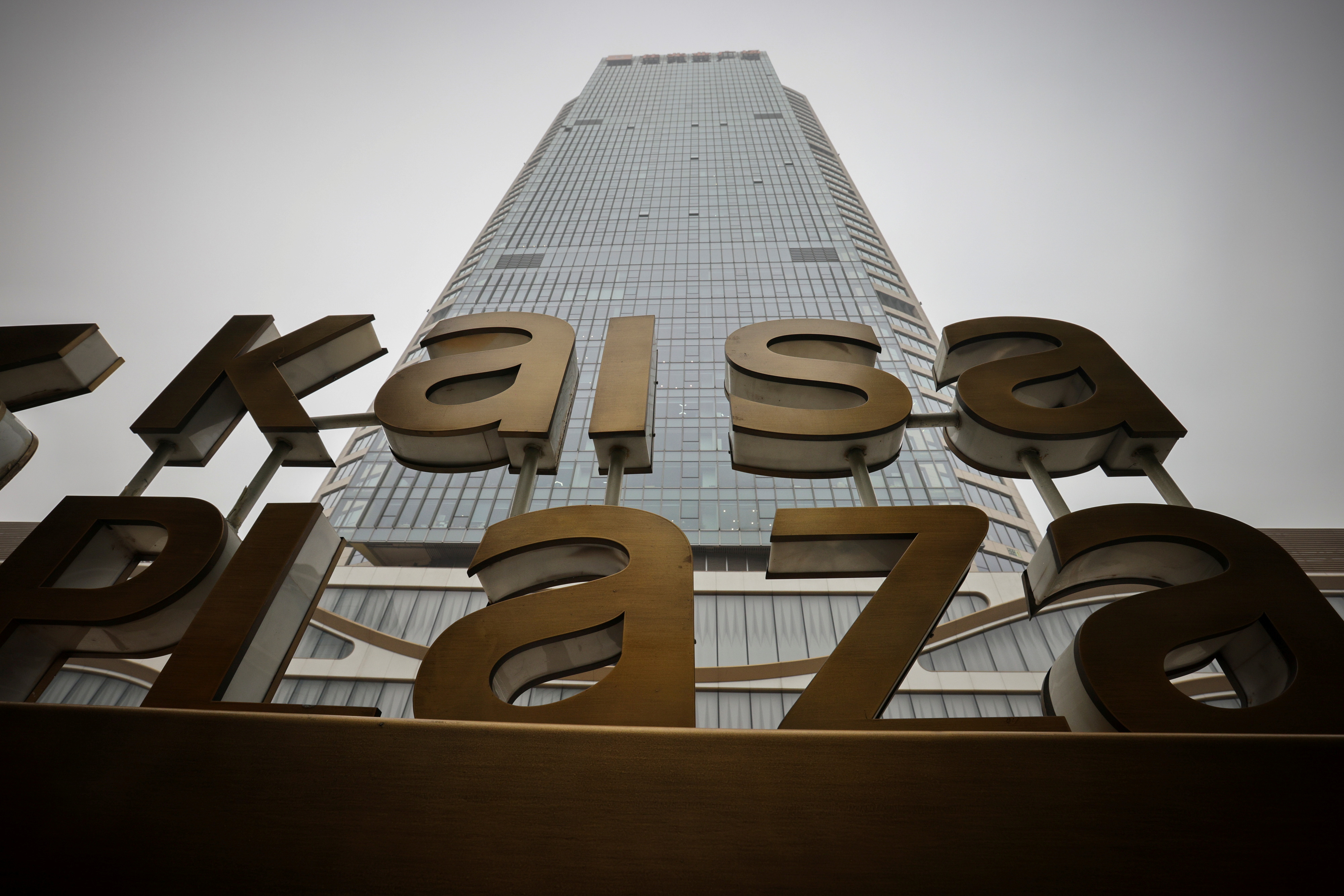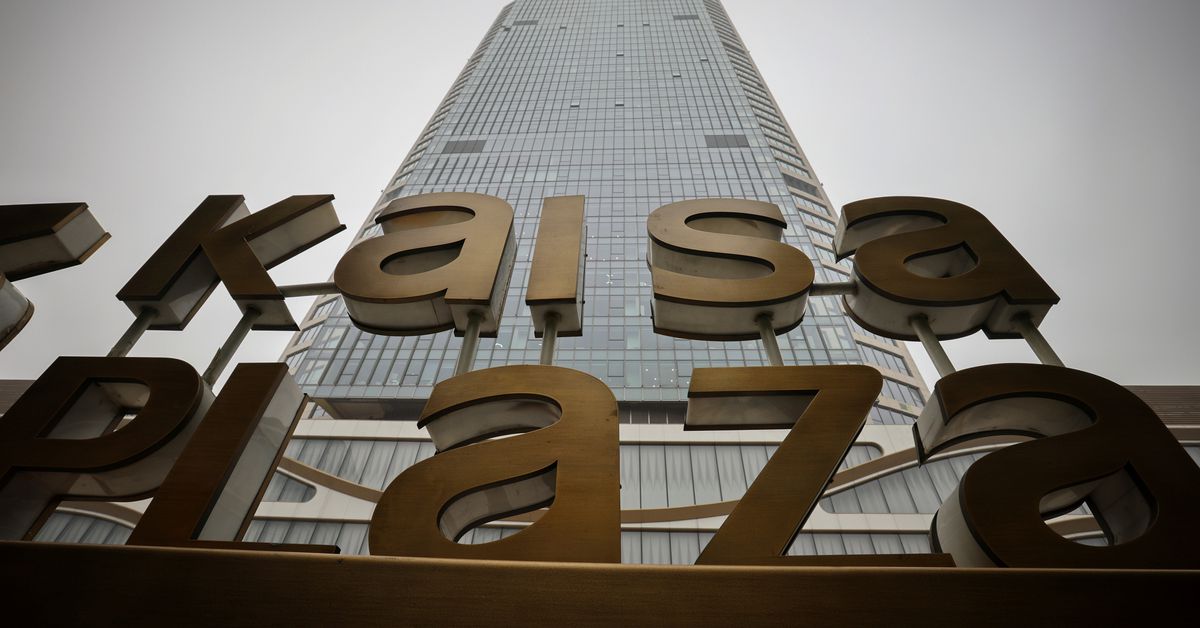SHANGHAI/BEIJING, Nov 9 (Reuters) – Kaisa Group Holdings (1638.HK) needs help to pay investors, workers and suppliers, the developer told a meeting of a Chinese government think-tank, banks and property firms, according to a source with direct knowledge of the matter.
China’s real estate sector has been hit by a liquidity squeeze, exacerbated by the troubles of China Evergrande Group (3333.HK). That has resulted in offshore defaults, credit rating downgrades and sell-offs in some developers’ shares and bonds.
The U.S. Federal Reserve said on Monday stresses in China’s real estate sector, caused in part by a regulatory focus on debt-laden firms, as well as a sharp tightening of global financial conditions could pose some risks to the U.S. financial system.
“Given the size of China’s economy and financial system… financial stresses in China could strain global financial markets through a deterioration of risk sentiment, pose risks to global economic growth, and affect the United States,” it said in its latest report on financial stability.
Underscoring the liquidity crunch, Fitch downgraded Kaisa deeper into default category on Tuesday, citing a deteriorating liquidity situation, undisclosed debt from wealth-management products, and limited progress on asset disposals.
The developer said it was trying to solve its liquidity problems, was consulting investors in wealth management products about better payment solutions, and pleaded for more breathing space.
“We sincerely ask investors to give Kaisa Group more time and patience,” it said in a statement on its official WeChat account late on Monday.
Kaisa attended a meeting earlier on Monday with the Development Research Center of the State Council, other developers and lenders in the southern Chinese city of Shenzhen, the source said.
The think-tank makes policy proposals on China’s national development and its economy, but is not a decision-making body.
At the meeting, Shenzhen-based Kaisa urged state companies to help private firms improve liquidity through project acquisitions and strategic purchases, the source added.
Participants at the meeting included China Vanke (000002.SZ), Ping An Bank (000001.SZ), China Citic Bank , China Construction Bank (601939.SS), CR Trust, Southern Asset Management and developer Excellence Group, according to the source.
Kaisa, China’s 25th largest developer by sales, told those at the meeting it is facing significant difficulties amid rating downgrades and banks curbing loans, the source said.
The developer said some financial institutions had transferred funds from its accounts inappropriately and it urged all lawsuits seeking a freeze of its assets to be handled centrally in a Shenzhen court, the source added.
Kaisa, Vanke and Citic Bank declined to comment. Excellence and the other banks that participated in the meeting did not immediately respond to requests for comment.
The State Council Information Office also did not respond to a request for comment. The source declined to be identified due to the sensitivity of the matter.

China’s property sector troubles have kept global markets on tenterhooks and led to a string of Beijing officials speaking out in a bid to reassure investors the crisis will not spiral out of control.
UPCOMING DEADLINES
Trading in shares of Kaisa, which has been looking to sell some of its assets to raise cash, and three of its units was suspended last week, a day after an affiliate missed a payment to onshore investors.
Kaisa has the most offshore debt of any Chinese developer after Evergrande.
Evergrande, the world’s most indebted developer, is grappling with liabilities of more than $300 billion, which, if not managed, could pose systemic risks to China’s financial system.
Beijing has been prodding government-owned firms and state-backed property developers to purchase some of Evergrande’s assets, people with knowledge of the matter previously told Reuters.
Some holders of offshore bonds issued by a unit of Evergrande had not received interest payments due on Nov. 6 by Monday evening in Asia.
Twice in October, Evergrande narrowly averted catastrophic defaults on its $19 billion worth of bonds in international capital markets by paying coupons just before the expiration of their grace periods.
One such period expires on Wednesday, Nov. 10, for more than $148 million in coupon payments that had been due on Oct. 11. Evergrande is also due to make coupon payments totalling more than $255 million on its June 2023 and 2025 bonds on Dec. 28.
Shares of Evergrande rose as much as 4% on Tuesday.
Evergrande on Monday sold shares worth $52 million in HengTen Networks Group (0136.HK), taking its total fundraising from selling down its stake in the Chinese internet services provider since Nov. 4 to $144 million.
Separately, shares of small developer China Aoyuan (3883.HK) jumped over 6%.
Infini Capital told Reuters on Tuesday it had accumulated shares of China Aoyuan’s property management unit, Aoyuan Healthy Life Group (3662.HK), continuously in the past few weeks to become its second-largest shareholder.
Aoyuan Healthy said last week it was in preliminary discussions with several independent third parties regarding the possible disposal of a stake in certain units.
Infini said it hopes Aoyuan Healthy will sell the whole company rather than its assets.
($1 = 7.7840 Hong Kong dollars)
Reporting By Samuel Shen, Cheng Leng and Tony Munroe; Additional reporting by Joy Leung and Clare Jim in Hong Kong; Writing by Anne Marie Roantree; Editing by Kim Coghill, Muralikumar Anantharaman and Jan Harvey
Our Standards: The Thomson Reuters Trust Principles.
